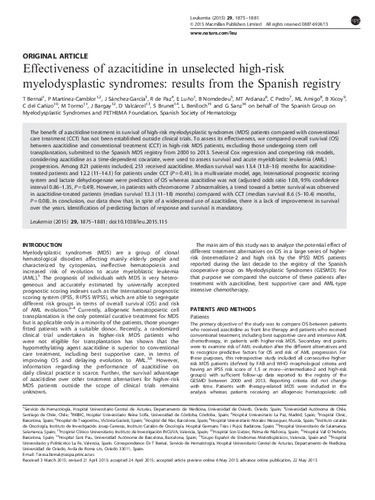Effectiveness of azacitidine in unselected high-risk myelodysplastic syndromes: Results from the Spanish Registry
Publication date:
Editorial:
Nature Publishing Group
Publisher version:
Citación:
Abstract:
The benefit of azacitidine treatment in survival of high risk myelodysplastic syndromes (MDS) patients compared to conventional care treatment (CCT) has not been established outside clinical trials. To assess its effectiveness, we compared overall survival between azacitidine and conventional treatment (CCT) in high-risk MDS patients, excluding those undergoing stem cell transplantation, submitted to the Spanish MDS registry from 2000 to 2013. Several Cox regression and competing risk models, considering azacitidine as a time-dependent covariate, were used to assess survival and AML progression. Among 821 patients included, 251 received azacitidine. Median survival was 13.4 (11.8–16) months for azacitidine-treated patients and 12.2 (11–14.1) for patients under CCT (P=0.41). In a multivariate model, age, IPSS and LDH were predictors of OS whereas azacitidine was not (adjusted odds ratio 1.08, 95% confidence interval 0.86–1.35, P=0.49). However, in patients with chromosome 7 abnormalities, a trend towards a better survival was observed in azacitidine-treated patients (median survival 13.3 [11–18] months) compared to CCT (median survival 8.6 [5–10.4] months, P=0.08). In conclusion, our data show that, in spite of a widespread use of azacitidine, there is a lack of improvement in survival over the years. Identification of predicting factors of response and survival is mandatory.
The benefit of azacitidine treatment in survival of high risk myelodysplastic syndromes (MDS) patients compared to conventional care treatment (CCT) has not been established outside clinical trials. To assess its effectiveness, we compared overall survival between azacitidine and conventional treatment (CCT) in high-risk MDS patients, excluding those undergoing stem cell transplantation, submitted to the Spanish MDS registry from 2000 to 2013. Several Cox regression and competing risk models, considering azacitidine as a time-dependent covariate, were used to assess survival and AML progression. Among 821 patients included, 251 received azacitidine. Median survival was 13.4 (11.8–16) months for azacitidine-treated patients and 12.2 (11–14.1) for patients under CCT (P=0.41). In a multivariate model, age, IPSS and LDH were predictors of OS whereas azacitidine was not (adjusted odds ratio 1.08, 95% confidence interval 0.86–1.35, P=0.49). However, in patients with chromosome 7 abnormalities, a trend towards a better survival was observed in azacitidine-treated patients (median survival 13.3 [11–18] months) compared to CCT (median survival 8.6 [5–10.4] months, P=0.08). In conclusion, our data show that, in spite of a widespread use of azacitidine, there is a lack of improvement in survival over the years. Identification of predicting factors of response and survival is mandatory.
DOI:
Collections
- Artículos [36307]
- Estadística e Investigación Operativa [281]
Files in this item




